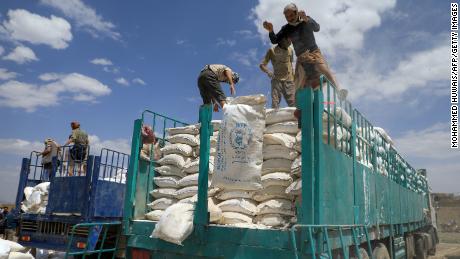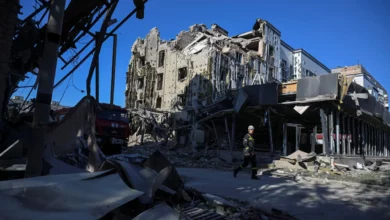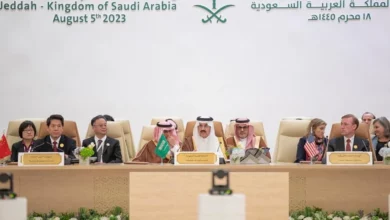
Abu Dhabi, UAE (CNN)A Russian invasion of Ukraine would send shockwaves across Europe and perhaps as far west as the United States. But a region further south may find itself an unlikely victim of a potential conflict.
Ukraine and Russia account for 23% of the world’s wheat exports, according to S&P Global. Global food prices are already near 10-year highs and the two countries’ market share means that any disruption in exports could cause grain prices to skyrocket.
Ukraine is dubbed the breadbasket of Europe, but Middle Eastern states too have come to rely heavily on its exports — to a level that some warn has become dangerously high.
The Middle East was Ukraine’s third largest wheat buyer in the 2020/2021 market year, according to the US Department of Agriculture. More than 40% of the country’s recent wheat exports went to the Middle East or Africa alone.
The International Monetary Fund projected that energy costs and commodities prices in many countries would rise should a conflict occur.
The effect on the Middle East, however, could be far worse than other countries, said Julien Barnes-Dacey, director of the Middle East and North Africa program at the European Council of Foreign Affairs.
“Fears of conflict hanging over two of the world’s major suppliers are clearly going to have some impact on prices, when there is already a sense of shortage,” he said.
Lebanon, Libya, and Egypt are among Ukraine’s biggest buyers in the region, with countries like Yemen and Syria depending on the World Food Programme’s procurement of Ukrainian wheat for aid.
Egypt, with a population of over 100 million, is the world’s largest importer of wheat. Authorities there are already warning about a shortage. Russia is Egypt’s primary supplier of wheat; Ukraine is its second.
“Skirmishes between two of the largest wheat and grains exporters in the world raises uncertainty in the market,” Minister of Supply and Internal Trade Ali Moselhy was cited as saying by state news agency MENA on Sunday.
Moselhy later told Reuters that a shortage could be covered by local suppliers for the time being, adding that he was “not concerned.”
A longer-term shortage could exacerbate an already dire food security situation in some of the region’s countries. Nearly 69 million people in the Middle East and North Africa are undernourished, according to a 2020 UN report, accounting for almost 9% of the global total. Many are in countries torn by conflict.
Hunger has been on the rise since 2014 in the region, says the UN Food and Agriculture Organization (FAO), with livelihoods plummeting after the Arab Spring uprisings and again after the Covid-19 pandemic. FAO placed the region’s prevalence of undernourishment in 2020 at 15.8%, compared to the global average of 9.9%.
“The real issue here is that there is a massive humanitarian crisis unfolding across the region, and those needs are already not being met,” said Barnes-Dacey.
States and donors might be able to procure grain from other sources but rising prices could impede an already underfunded network of importers, analysts said.
“When current needs are already going unmet, it is hard to imagine that you’ll be able to secure this massive new push needed to meet new needs,” said Barnes-Dacey, noting that the region’s most volatile states might “not even find it within the realm possibility” to secure additional sources.
Disruptions to key ports in the Black Sea, which borders both Russia and Ukraine, as well as a rise in energy costs, could compound the situation.
The region specifically “will be a major casualty of a potential conflict in [Russia and Ukraine],” World Food Programme spokesperson for the Middle East Abeer Etefa said. Wheat would be the most severely impacted commodity.
“This might be a new lesson [for Arab countries], that we must balance out procurement,” former adviser to Egypt’s supply ministry, Nadr Nour Eldin, told CNN, “So that we can always diversify and permanently secure supplies if there are ever conflicts.”




